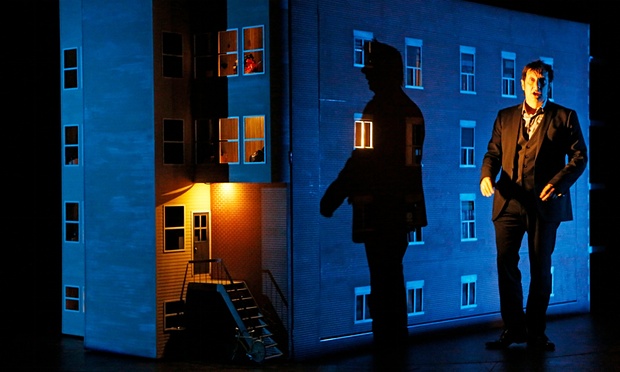Speak white! / C’est une langue universelle / Nous sommes nés pour la comprendre / Avec ses mots lacrymogènes / Avec ses mots matraques…
On the stage is a beautifully crafted model of a 1930s apartment block – a kind of giant dolls house, with each apartment lighting up as our storyteller describes who lives there. This is 887 Avenue Murray in Quebec City, this is the 1960s, and here are the Lepage family.
The patriarch of the family is a taxi driver, and his young son Robert pines for him – watching for his dad out of the window, excited when he sees the cab waiting down below with its engine running – hurrah, he’s home – then deflated when the cab drives off to answer the call to a new fare.
Robert Lepage’s relationship with his father is at the heart of 887 – which extends to the broader notion of the patriarch, and with the land of the fathers. In a breathless two-and-a-half-hour marathon that merges verbal, physical and visual storytelling with a kind of mock-lecture mode, we are given a crash-course in the history of Francophone Canada; a close up focus on the politics of Quebec in the 1960s, when the Front de Libération du Québec was trying to establish an independent, French-speaking state; and the story of Lepage’s own personal family history, and where it is placed within all of this. It’s a rollercoaster ride through social history and popular culture, hopping from one thing to another with the speed of a synaptic connection in the brain.
Running through as a recurring thread is the actor’s need to memorise an iconic Quebecoise poem, to be delivered at a conference – Michèle Lalonde’s Speak White. The title refers to the demand that slaves speak the tongue of their white oppressors; a phrase that was picked up English-speaking Canadians and used in an attempt to suppress the French language in Quebec. His struggle to learn the words is played as a metaphor for Quebec’s struggle to find its voice. By the end of the show everything falls into place, and we get a word perfect and electrifying delivery of the poem.
The show, as we’d expect from Lepage, is a feast of beautiful visual images. There’s the gorgeous apartment block dolls house, which swings around to become Lepage’s full-sized kitchen; and another smaller house, visited using live feed video to see into the rooms – Lepage’s face looming large at the end of a passage like Alice in the White Rabbit’s house – a nice reference to the fact that both this show and Lewis Carroll’s classic use a play on scale to investigate the experiences of childhood. There are montages of TV news clips, maps, and family photos; a marvellous Charles De Gaulle puppet in a top pocket declaiming ‘Vive le Quebec livre!’; and Lepage Senior’s taxi represented by remote-control cars of various sizes.
The programme notes for the show make a lot of the fact that 887 is about the process of memory – and of course it is, although the crux is not memory generally but these particular memories, and how they inform Robert Lepage’s view on his heritage and his place in the world. The sections where it broadens out into lecture-demonstration discussion of the physiology of memory and the condition of Alzheimer’s are the least interesting. It’s almost as if Lepage started to make a show about memory, but in the process of creating the show became far more interested in what his own personal memories meant to his re-evaluation of his own life – which ultimately come down to addressing what it means to be the son of this father, in this family, in this fatherland.
It is an extraordinary amount of content, a phenomenal tour-de-force, and it is a very new show. There have been some grumblings about the show’s length and the fact that there are one or two blind alleys wandered down, but to me it feels like an enormous honour to be in on the work right from the start – knowing (as is oft the way with Lepage shows) that it will change as it is performed throughout the world.
The scorchingly passionate text of Speak White ends with words that perfectly encapsulate the notion of nationhood and shared language, but also (in this context) the very process of being a theatre-maker and the universality of theatrical language: remembering and reproducing words, gestures and images, conjuring them up using the intertwined powers of memory and imagination, so that stories that need to be remembered are told:
We’re doing all right / We’re doing fine / We / Are not alone / We know / That we are not alone

